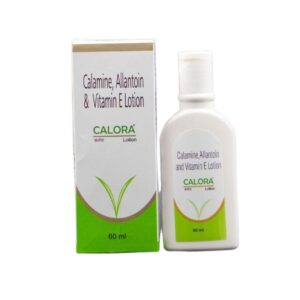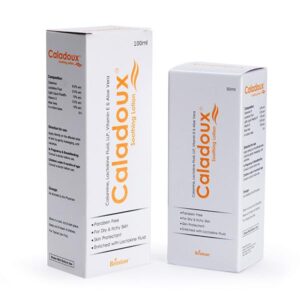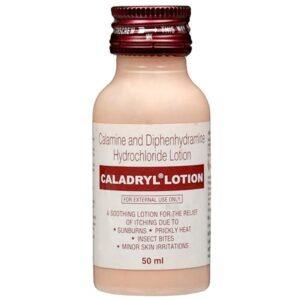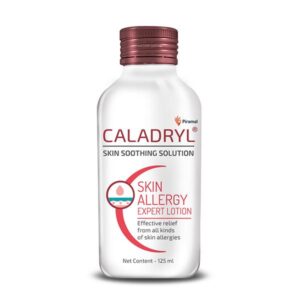DIPHENHYDRAMINE + CAMPHOR + CALAMINE + SPECIALLY DENATURATED SPIRIT
Diphenhydramine: Diphenhydramine is an antihistamine medication used for allergies, hay fever, cold symptoms, and insomnia. It is commonly found in over-the-counter sleep aids, allergy medications, and cough and cold remedies. The drug works by blocking the effects of histamine, a substance produced by the body during an allergic reaction.
Diphenhydramine can be taken orally in tablet or liquid form. The dose varies depending on the age of the patient and the specific indication. For adults and children aged 12 and above, the recommended oral dose for allergies or allergic reactions is 25-50 mg every four to six hours, while the dose for insomnia is typically higher, ranging from 50-100 mg taken 30 minutes before bedtime.
Common side effects of diphenhydramine may include drowsiness, dry mouth, blurred vision, constipation, and difficulty urinating. These side effects are usually mild and temporary. However, some individuals may experience more severe reactions such as nervousness, confusion, hallucinations, and rapid heartbeat. If any of these occur, it is important to seek medical attention immediately.
It is worth noting that diphenhydramine can cause significant drowsiness, impairing alertness and reaction time. Therefore, it is advised to avoid activities such as driving or operating heavy machinery until one is familiar with how the medication affects them.
Additionally, diphenhydramine may interact with other medications, including sedatives, tranquilizers, and certain antidepressants. It is essential to consult with a healthcare professional or pharmacist before taking diphenhydramine in combination with other drugs.
In summary, diphenhydramine is an antihistamine drug used to alleviate symptoms of allergies, hay fever, colds, and insomnia. It works by blocking the effects of histamine. The dose and specific indication vary, but common side effects include drowsiness, dry mouth, and blurred vision. Immediate medical attention should be sought if severe side effects occur.
Camphor: Camphor is a medication derived from the camphor tree (Cinnamomum camphora). It has various uses including as a topical analgesic, as a cough suppressant, and as an insect repellent.
The mechanism of action of camphor is not fully understood but it is believed to work by stimulating nerve endings to relieve pain and itching when applied topically. It also has mild anesthetic properties and helps to reduce inflammation.
Camphor is available in different forms such as ointments, gels, and oils for topical application. The concentration of camphor can vary, and it is important to follow the instructions provided by the manufacturer or healthcare professional regarding the appropriate dose and application method.
When used topically, common side effects of camphor can include skin irritation, redness, and rash. Ingesting or inhaling high concentrations of camphor can be toxic and lead to symptoms such as nausea, vomiting, confusion, seizures, and even organ damage. Therefore, it is important to use camphor as directed and avoid applying it to broken skin or open wounds.
Camphor is not recommended for use in infants and young children, as it can be toxic when absorbed through the skin or if ingested. It should also be used with caution in pregnant or breastfeeding women.
It is important to consult with a healthcare professional before using camphor to ensure it is appropriate for your specific condition, and to discuss any potential drug interactions or contraindications.
Calamine: Calamine is a medication that is commonly used for its soothing and protective effects on the skin. It is available in various forms, including lotion, cream, and ointment.
The primary use of Calamine is to relieve itching, irritation, and discomfort caused by minor skin conditions such as sunburn, insect bites, poison ivy, and rashes. It works by forming a protective barrier on the skin, which helps to alleviate symptoms and protect the affected area from further irritation.
The recommended dose and application method of Calamine may vary depending on the form of the medication and the severity of the skin condition being treated. Generally, it is applied topically to the affected area as directed by a healthcare professional or as specified on the product label. It is important to clean and dry the affected area before applying the medication.
While Calamine is generally considered safe, some individuals may experience minor side effects. These can include skin redness, dryness, or a mild burning sensation at the application site. If any of these side effects worsen or persist, it is recommended to consult a healthcare provider.
It is important to note that Calamine should not be used on open wounds or broken skin, and it is not suitable for internal use. Furthermore, it is always advisable to consult a healthcare professional before using Calamine to ensure it is appropriate for your specific condition and to determine the correct dosage and application method.
Specially Denaturated Spirit: Specially Denatured Spirit (SDS) is a type of denatured alcohol that is often used for industrial or non-consumable purposes. It is commonly used in industries such as manufacturing, painting, and printing.
The main purpose of denaturing alcohol is to render it unsuitable for human consumption by adding chemicals that make it extremely bitter, unpalatable, or even toxic. SDS is no exception, and it is specifically formulated to discourage consumption.
The main mechanism of action of SDS is its high alcoholic content. Alcohol in general acts as a central nervous system depressant, producing effects such as relaxation, sedation, and impaired coordination. However, since SDS is not intended for human consumption, the specific mechanism of action may not be extensively studied.
As SDS is not intended for internal use, it does not have a specific recommended dose. Its use is primarily for external or industrial purposes, such as cleaning, disinfection, or as a solvent.
Due to its high alcohol content, SDS can cause skin irritation or dryness if it comes into contact with the skin for an extended period. Inhalation of the fumes may also irritate the respiratory system. Additionally, accidental ingestion of SDS can lead to symptoms like nausea, vomiting, dizziness, or even alcohol poisoning.
It is important to handle SDS with caution and use it in a well-ventilated area to reduce the risk of inhaling the fumes. Proper personal protective equipment, such as gloves and goggles, should be worn when handling SDS to prevent skin and eye irritation.
As always, it is advisable to consult the product’s safety data sheet (SDS/MSDS) and follow the manufacturer’s instructions for safe handling and use.




